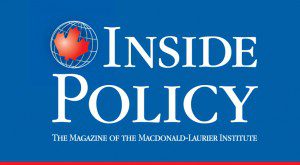 They are known for radically different climates, but Canada and Australia have a lot in common when it comes to their polar regions. Andrew Pickford and Jeff Collins, the authors of a recently-released MLI commentary, say it’s time they worked better together to pursue common interests.
They are known for radically different climates, but Canada and Australia have a lot in common when it comes to their polar regions. Andrew Pickford and Jeff Collins, the authors of a recently-released MLI commentary, say it’s time they worked better together to pursue common interests.
By Andrew Pickford and Jeff Collins, April 13, 2016
Over two centuries ago, polar activities in what became Canada and Australia were connected by one man, Captain James Cook. This occurred before nationhood and was driven by the British Royal Navy’s grand strategy. Cook is familiar to Canadians for his pivotal role in mapping the treacherous St Lawrence River and helping James Wolfe prepare his famous amphibious landing to secure Quebec City, and with it North America, for the British.
With remarkable accuracy, in the 1770s Cook mapped Newfoundland. For Australians, Cook is recognised as claiming Australia for the British enroute to observing the Transit of Venus.
Less well known about Cook’s exploration was his efforts to locate what is now known as Antarctica, as well as to find the Northwest Passage.
It is easy to dismiss the activities of James Cook as a historical footnote. However, he was a part of geopolitical competition which saw European powers push outwards and control, then colonise what were viewed as empty lands. More recently, in World War II and during the Cold War, Polar Regions represented potential zones of competition. It is only in the recent past that the Arctic and Antarctica have been home to collaboration and international harmony.
But what happens when the great powers of the 21st century begin to view the polar regions as core to their strategic interests? Will the status quo prevail or will there be a new cold rush?
With competition over the Polar Regions increasing, Canada and Australia may want to collaborate on their Arctic and Antarctic endeavours in case soldiers replace scientists in these cold, hostile and unforgiving environments.
For Canada, the possibility of resource riches and an opening of the fabled Northwest Passage sea route between the Atlantic and Pacific Oceans offers both an opportunity for future prosperity and a challenge. For Australia, maintaining its pre-eminent position in Antarctica will become more difficult as will ensuring that the continent does not become a contested southern flank.
The agreements and collective approaches underpinning the Polar Regimes have been remarkably successful with an emphasis on science and consensus. However, a vastly different international security environment is starting to emerge. The first decade of the 21st Century saw the divergence between a camp of largely Western nations who viewed Polar Regions as a site of scientific and environmental collaboration and an alternate group including China, Russia, India, and Brazil that are seeking more influence and access which could potentially include resource extraction.
Neither peace nor conflict is a predetermined outcome. Yet, assuming that arrangements in Polar Regions will remain unchanged is naïve. This fails to grasp realpolitik decisions by powers that do not benefit from existing arrangements.
With potential energy riches in both regions as well as other yet to be identified natural and biological resources, attention will return when commodity prices again spike. These drivers have already prompted China to take a more active presence in both poles.
Hence, a change to the status quo and competition over Polar Regions represents a significant challenge to Ottawa and Canberra but is also an opportunity here for both countries to create a framework for cooperation. Both countries must plan for all contingencies, especially resource competition as well as potential militarisation of these zones.
To help develop respective capabilities and maintain influence of these zones, we recommend that Canadian-Australian cooperation in the Polar Regions proceed along three key themes: personnel exchanges; joint procurement of equipment; and mutual recognition of territorial claims.
With Canada’s years of experience in operating air, naval and coast guard assets in the Arctic, Australian personnel could gain valuable Polar operational experience through exchanges with their Canadian counterparts. With procurement, the different hemispheric calendar cycle allows for Canada to possibly rent out Australia’s soon-to-be built icebreaker while Ottawa awaits the building of the CCGS Diefenbaker, thus plugging a capability gap and saving money by allowing for the retiring of the 46-year old CCGS Louis St. Laurent, the largest icebreaker in the Canadian Coast Guard.
Finally, both countries stand to benefit in mutually recognizing each other’s territorial claims in the Antarctic and Arctic, respectively. Considering that no other state accepts the respective polar claims of Canberra and Ottawa, a small but nevertheless significant diplomatic victory could be achieved, paving the way for possible additional international recognition by other states. While none of these recommendations is a fail-safe from great power contestation in the Arctic and Antarctic, both countries need to maximize their limited resources.
Cook’s expeditions resulted in an expansion of the British Empire that displaced earlier claimants and owners of land. Ambitious powers of the 21st century might similarly have little interest in the status quo. They may even undertake scientific expeditions to polar regions which include military and mining personnel.
Andrew Pickford is an Australian defence and security analyst based in Canada and Jeffrey F. Collins is a Canadian-based defence and security analyst.




